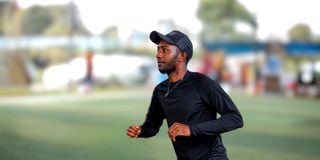Why Nakuru youth are taking a break from social media

(From left) Edwin Gitonga, Bridget Kambo and Sammy Ngahu share why they have decided to take a social media break.
In a world dominated by constant notifications and algorithm-driven content, a growing number of young people in Nakuru are consciously stepping away from social media to regain control over their mental well-being.
One of them is Edwin Gitonga, a student at Mount Kenya University pursuing a Bachelor of Education in Physics and Mathematics, who is also a passionate actor.
Gitonga recently took a two-week digital detox, and he’s still maintaining a reduced social media presence. The decision, he says, stemmed from the overwhelming pressure he felt online.
“I used to compare myself with people I followed, seeing them succeed while I felt stuck,” he shares. “I also had the urge to be seen, to be known, to be on screen. But I realized I was chasing something that was draining me.” Gitonga needed space to reconnect with himself. “I just wanted peace, time to rest and reflect.”
Though stepping away wasn't easy, Gitonga filled the void with activities that grounded him.
He found comfort in simple things visiting local carpenters to watch them craft furniture, dancing, basking in the sun, and writing scripts he had long postponed.
For information, Gitonga turned to the radio or asked a friend for updates on a call, noting to avoid feeling like he was missing out.
"To be updated especially on matters politics I would only tune in to the radio at 6 a.m., and listen to newspaper reviews especially when I felt like I missed being online, but I used to remind myself that it was time to rediscover life," he says.
Bridget Kambo, who has been on a social media break since November last year, echoes a similar sentiment.
“The pressure online was just too much. And my TikTok feed was flooded with political content that was draining me emotionally,” she says.
Instead of scrolling, Bridget turned to crocheting a skill she taught herself via YouTube and reading books.
“At first, I just wanted peace. But over time, I realized I was also learning, growing, and it has helped me to make a little money from crochet,” she says
While she sometimes feels tempted to return online to catch up on trending news, she instead asks friends or keeps her focus on creative projects.
“Social media used to take a lot of my time which would be depressing especially with the issues happening in the country but now I use it to draw inspiration from it, but it no longer controls me,” Bridget says
Sammy Ngahu, a poet, took a two-day digital break after realizing just how addicted he had become to his phone.
Constantly scrolling, checking updates, and hopping between apps had become second nature until he decided it was time to disconnect and breathe.
“I felt I was too attached to my phone,” he admits, “so I took a step back.”
During the short break, Ngahu spent most of his time reading and catching up on sleep two things he had been neglecting due to endless screen time.
“It felt different at first, but refreshing,” he says. “Just letting my mind rest without the pressure of constantly staying online was something I really needed.”
Though brief, his break was intentional and revealing reminding him of the importance of balance.
Jeff Chege, a Psychologist at Kivuli Wellness Center, says that digital overload has become a serious concern among youth.

Jeff Chege, a psychologist in Nakuru.
“While technology has its advantages, too much screen time leads to anxiety, poor sleep, and burnout,” he explains.
Chege recommends digital breaks for restoring clarity and mental balance. “Take time to notice signs like irritability, trouble concentrating, or compulsive scrolling. That’s your mind asking for a reset. Instead of consuming content endlessly, be intentional. Use that time to walk, read, or connect face-to-face,” he says.
Chege notes that digital breaks are not about avoidance but are essential for maintaining psychological balance in a digital age.
He adds that mindful use of technology promotes both informed living and peace of mind.
In a generation raised online, learning to unplug is a radical act of self-care. For Gitonga, Bridget, and Ngahu, these digital pauses aren't about escaping reality, they're about reclaiming it.


